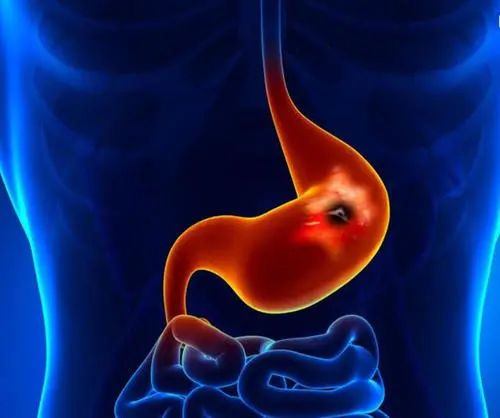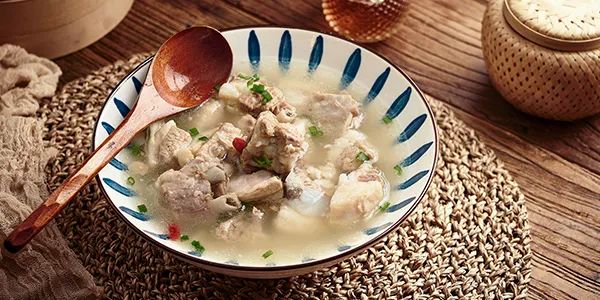
Click the blue text above to follow us~
The Spleen – the foundation of postnatal life
When the spleen and stomach are injured, all five organs are affected,
Spleen and stomach Yang deficiency is particularly troublesome,
Supplementing may cause more dampness, while clearing may lead to more cold,
Not daring to eat anything truly gives one a headache.
In daily life, many people, or rather most patients with spleen and stomach disorders, suffer from spleen and stomach Yang deficiency. So what is spleen and stomach Yang deficiency?

Traditional Chinese Medicine (TCM) believes that spleen and stomach Yang deficiency refers to the deficiency of Yang Qi in the spleen and stomach, characterized by the presence of internal cold and dampness. The formation of spleen and stomach Yang deficiency is related not only to congenital insufficiency but also to personal dietary habits and lifestyle, such as long-term consumption of cold foods, excessive fatigue and worry, or prolonged illness.
How can one know if they have spleen and stomach Yang deficiency? After all, the same symptoms may have different causes, and we must treat according to the symptoms to see results.
In daily life, the following manifestations are responses of spleen and stomach Yang deficiency.

Stomach Pain
Friends with spleen and stomach Yang deficiency are prone to stomach pain, especially when the weather turns cold or after consuming too many cold foods. At this time, it is necessary to drink some warm water or apply a hot compress to relieve the stomach pain.
Poor Appetite
A significant characteristic of spleen and stomach Yang deficiency is poor appetite, often leading to a lack of desire to eat. Therefore, patients with spleen and stomach Yang deficiency often appear pale, weak in limbs, and undernourished.
Fatigue
When the spleen and stomach are in a Yang deficiency state, their function is certainly affected. The spleen is an important organ for the transformation and transportation of food. When its function is obstructed, it cannot effectively deliver various nutrients, leading to fatigue.
Thus, individuals with spleen and stomach Yang deficiency often feel easily fatigued, even reluctant to get up from the sofa.
Cold Hands and Feet
It is said that insufficient Qi and blood can cause cold hands and feet, but in fact, weak spleen and stomach can also lead to this condition.
This is because all the nutrients for the body’s tissues need to be provided by the spleen and stomach. When their function is poor, it leads to insufficient Qi and blood, making it difficult for the extremities to absorb enough nutrients.
Excess Dampness
Friends with spleen and stomach Yang deficiency may also experience excess dampness. This is because the spleen and stomach function poorly, making it difficult to expel dampness from the body, leading to symptoms of excess dampness over time.
Main manifestations include loose stools, with stools often being watery; pale tongue with white coating, indicating a very pale color, and the tongue coating appears white, with a lack of taste in food.
With the above symptoms, it can be basically confirmed as spleen and stomach Yang deficiency. If it is still difficult to determine, it is best to consult a qualified TCM physician for diagnosis and treatment.

How should we regulate spleen and stomach Yang deficiency?
Start with warming and tonifying the spleen and stomach
In fact, regulating spleen and stomach Yang deficiency mainly relies on dietary adjustments, using warming and tonifying foods, and avoiding cold and cool items.
Today, I recommend some commonly eaten, delicious, and beneficial ingredients for friends with spleen and stomach Yang deficiency:
Glutinous Rice: Mild in nature and sweet in taste, consuming more glutinous rice in daily life can effectively improve symptoms of spleen and stomach Yang deficiency, warming the spleen and stomach, and treating spontaneous sweating and diarrhea.
Fried Rice: Fried rice refers to lightly frying millet or rice. It can be used to make porridge, which is very beneficial for spleen Yang deficiency, especially in autumn and winter.
Lamb: Sweet in taste and warm in nature, it enters the spleen, stomach, kidney, and heart meridians; it warms and tonifies the spleen and stomach, used to treat symptoms such as regurgitation, weakness, and cold intolerance due to spleen and stomach Yang deficiency; it warms and tonifies the liver and kidney, treating symptoms like lower back pain and impotence due to kidney Yang deficiency; it nourishes blood and warms the meridians, used for abdominal pain due to blood deficiency and cold after childbirth.
Pork Stomach: Slightly warm in nature and sweet in taste, compared to the stomachs of other animals like beef and lamb, it directly nourishes the body’s good soil, yielding particularly good results. Especially for the elderly, women, and children with weak spleen and stomach, consuming pork stomach soup can help tonify the spleen and stomach and has good auxiliary effects on other diseases caused by spleen and stomach discomfort.
Lotus Root: It has the effects of strengthening the spleen and nourishing the stomach, calming the heart and mind, and clearing heat. Fresh lotus root is slightly cool and difficult to digest when eaten raw, so for those with spleen Yang deficiency and prone to diarrhea, it is advisable to consume cooked lotus root. Eating more lotus root can achieve the effects of strengthening the spleen and nourishing the stomach, calming the heart and mind.
Leek: Spicy and warm in nature, it enters the liver, stomach, and kidney meridians, warming the middle and promoting Qi, effective for symptoms of kidney Yang deficiency, abdominal pain due to internal cold, and other cold deficiency syndromes.
Pumpkin: Warm and sweet in nature, it enters the spleen and stomach meridians, making it a good ingredient for tonifying Qi and strengthening the spleen and stomach.
Many fruits are cool in nature, so friends with spleen and stomach Yang deficiency should be particularly cautious when consuming fruits. Here are a few fruits that are more suitable for those with spleen and stomach Yang deficiency:
Durian: A warm fruit that invigorates blood circulation, dispels cold, strengthens the spleen, tonifies Qi, and warms the body. It is very suitable for those with spleen and stomach Yang deficiency, cold dysmenorrhea, post-illness weakness, and postpartum women, providing excellent nourishing effects.
Lychee: Warm in nature and sweet and sour in taste, it has the effects of nourishing blood, generating fluids, regulating Qi, and relieving pain, making it suitable for those with cold syndromes like cold womb and spleen and stomach Yang deficiency.
Longan: Also a warm fruit, it nourishes blood, benefits the spleen, and calms the heart and mind. It is very suitable for those needing nourishment after illness and for those with weak constitutions, providing auxiliary effects for those with blood deficiency.
Peach: Warm in nature and sweet and sour in taste, it has the effects of nourishing the liver, tonifying the heart, generating fluids, and nourishing blood, suitable for those with Qi and blood deficiency and pale complexion.
Pomegranate: Warm in nature, sweet, slightly sour, and astringent, it can warm Yang, astringe, and stop diarrhea. Pomegranate can treat long-term diarrhea due to spleen deficiency, blood in stools, prolapse of the rectum, and its peel can kill parasites and treat abdominal pain due to parasitic accumulation.
The above fruits are warm in nature and suitable for patients with spleen and stomach Yang deficiency, but they should be consumed in moderation to protect the spleen and stomach.
Additionally, I recommend two dietary therapy recipes suitable for regulating spleen and stomach Yang deficiency in autumn and winter.
Ginger Date Tea
[Ingredients] 15g fresh ginger, 3 red dates, appropriate amount of brown sugar. (1 serving)
[Method] Remove the pits from the red dates, cut the ginger into pieces, boil in water, and add brown sugar to dissolve.
[Effects] Warms the stomach, dispels cold, nourishes blood, and harmonizes blood. Suitable for those with spleen and stomach Yang deficiency and cold stagnation.
Angelica Ginger Lamb Soup
[Ingredients] 150g lamb, 15g angelica, 5g dried tangerine peel, 15g fresh ginger. (2 servings)
[Method] Clean and cut the lamb into pieces, sauté until fragrant. Wash the angelica, dried tangerine peel, and ginger, add to the pot with the lamb, add appropriate amount of water, boil on high heat, then simmer for 1-2 hours, season, and serve.
[Effects] Warms Yang, dispels cold, and relieves pain. Suitable for patients with spleen and stomach Yang deficiency.

In addition to dietary aspects, we can also regulate from other aspects:
-
Keep the stomach warm by using a hot pack or hot water bottle wrapped in a dry towel, applying it to the painful area of the stomach, which can provide comfort.
-
Acupoint massage can be performed, such as massaging the Tianshu point, located on both sides of the navel.

——Children with spleen and stomach Yang deficiency often suffer from irregular feeding, repeated illnesses, or excessive vomiting and prolonged diarrhea, damaging the spleen and stomach.
——Accumulated food refers to a TCM syndrome, mainly indicating that children have overconsumed milk or food, damaging the spleen and stomach, leading to gastrointestinal disorders due to food stagnation. This syndrome often occurs in infants and young children, mainly manifesting as abdominal distension, dry or foul-smelling stools, foul gas, sour belching, and abdominal heat.

Children with spleen and stomach Yang deficiency
Children with spleen and stomach Yang deficiency generally show symptoms of poor appetite, eating little and slowly. Poor spleen and stomach function can lead to abdominal distension, constipation, abdominal pain, vomiting, abdominal enlargement, weight loss, pale complexion, lack of exercise, weak muscles, frequent fatigue, cold extremities, loose or constipated stools, pale tongue coating, slow physical development, and susceptibility to illness. Therefore, timely regulation and treatment for children with spleen and stomach Yang deficiency are necessary to avoid affecting their health.

Note: The text and images are for internal learning reference only.


